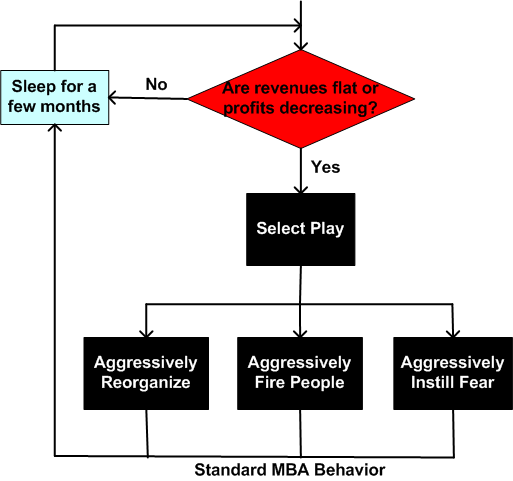Archive
Cracked Up
One of the reasons why I love Russell Ackoff is that he cracks me up even while he writes about depressingly serious matters. Here’s just one example from his bottomless well of wisdom:
Business schools do not teach students how to manage. What they do teach are (1) vocabularies that enable students to speak with authority about subjects they do not understand, and (2) to use principles of management that have demonstrated their ability to withstand any amount of disconfirming evidence. – Russell Ackoff
Want another example? OK, OK, here it is:
“Walk the talk” is futile advice to executives because for them walking and talking are incompatible activities. They can do only one at a time. Therefore, they choose to talk. It takes less effort and thought. – – Russell Ackoff
The Uselessness Of MBAs
Two of my favorite management (or anti-management, if you prefer) thinkers and doers, Henry Mintzberg and Ricardo Semler, talk about the uselessness of MBA degrees for managing people in this MIT World video. In the video, Mr. Semler interviews Mr. Mintzberg shortly after the release of Mintzberg’s book, “Managers Not MBAs“, in 2005. The interview is conducted in front of a class full of MIT MBA students.
In case you’re interested, here are some of my notes:
This will work in practice, but will it work in theory 🙂
You can’t create a manager in a classroom. When you do that, all you do is create hubris.
MBA students are taught how to apply business skills in an assumed command-and-control hierarchy, not how to be a manager. B-schools don’t distinguish between the two.
Management is craft (rooted in experience), art (rooted in creativity) and analysis (rooted in science). It’s not just analysis – which is what B-schools exclusively teach.
Earn a management position first, then go to business school while you are a practicing newbie manager.
There are no naturally born surgeons, but there are many natural managers who never went to MBA school.
The problem with being in a rat race is that if you win, you’re still a rat 🙂
In a study of Harvard MBA gradutates, 10 of 19 were outright failures, 4 had questionable records, and 5 did fine.
The notion that a generic manager can parachute in and manage anything is crazy. There are exceptions like IBM’s cookie man, Lou Gerstner, but failure is the norm.
Many managers practice “Kiss up, kick down”. The dudes who receive the kisses don’t care or want to know about the “kick down” behavior.
Without action, nothing gets done. Without reflection, action is mindless. Thus, mindful action is required for success.
Analysis Paralysis Vs. 59 Minutes
“If I had an hour to save the world, I would spend 59 minutes defining the problem and one minute finding solutions” – Albert Einstein
If they didn’t know that Einstein said the quote above, MBA taught and metrics-obsessed “go-go-go” textbook managers would propose that the person who did say it was a slacker who suffered from “analysis paralysis”. In the Nike age of “just do it” and a culture of “act first and think later” (in order to show immediate progress regardless of downstream consequences), not following Einstein’s sage advice often leads to massive financial or human damage when applied to big, multi-variable hairball problems.
The choice between “act first, think later” (AFTL) and “think first, act later” (TFAL) is not so simple. For small, one dimensional problems where after-the-fact mistakes can be detected quickly and readjustments can be made equally as quickly, AFTL is the best way to go. However, most managers, because they are measured on schedule and cost performance and not on quality (which is notoriously difficult to articulate and quantify), apply the AFTL approach exclusively. They behave this way regardless if the situation cries out for TFAL because that’s the way that hierarchical structured corpo orgs work. Since the long term downstream effects of crappy decisions may not be traceable back to the manager who made them, and he/she will likely be gone when the damage is discovered, everybody else loses – except the manager, of course. Leaders TFAL and managers AFTL.
Two Playbooks
When revenues and/or profits go flat or they start eroding, one of the 3 textbook moves that a mediocre company usually make is to reorganize (yet again). The other two moves in the utterly uncreative and standard MBA playbook are: 2) fire people; 3) instill fear via coercion and adding more rigid/constraining processes to extract more productivity from the value creation team at the bottom of the corpo hierarchy. Sometimes, especially in a time of crisis, all three actions are executed. Notice that all 3 moves are attempts to cut costs and not to raise revenues. Raising revenues requires exploring, discovering, and finding new customers along with developing successful new products that open up new markets. These actions require creativity, innovation, new ways of thinking, leadership, and courage. Sadly, these attributes are not the forte of mechanistic and Newtonian MBAs who are trained to solely look at data and compute fancy state-of-the art derivative business metrics.

When a company reorganizes, which is the least painful action that can be applied to the productive members at the bottom of the org, grand new titles are created, groups are renamed, and new layers are added/subtracted. Management temporarily feels better and optimism permeates the top of the stratified pyramid. The people down in the dirty boiler room know better. Since the reorg usually consists of shuffling the same people with the same old crusted mindsets into new positions, no deep and lasting change happens. If, during the reorg, people with new ideas are promoted from the bottom or brought in from the outside, they are quickly “set in their place” by the old guard that remains. They get absorbed by the borg. Blech.



